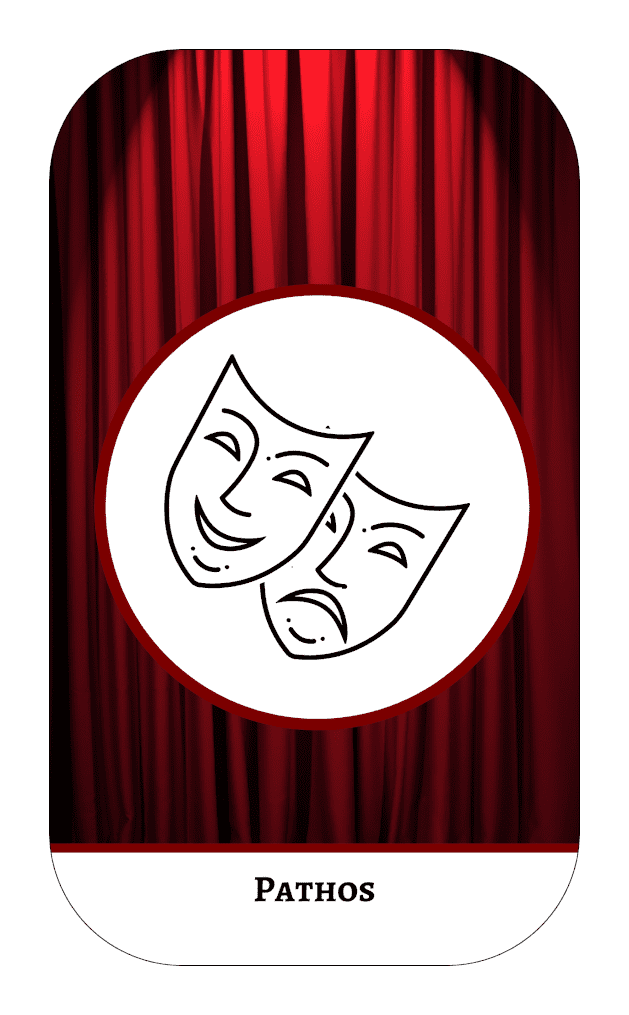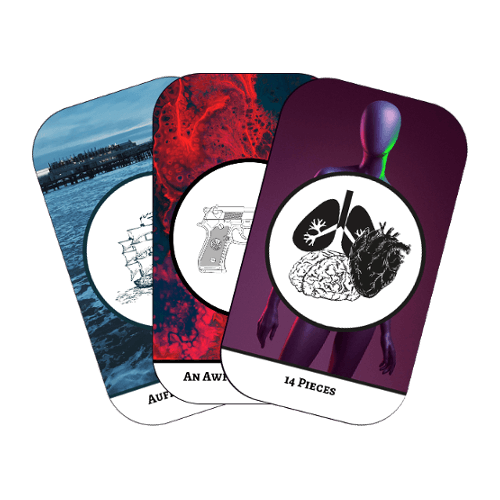Pathos
Interpretation & Meaning

Saturday night in ancient Greece means popcorn, a date and a gargantuan theater.
In the audience, agitated men discuss weather, food, politics, but when the first actor enters the stage everyone’s voice drops dead. As he walks to the center of the space there’s no whisper, no ring tone, even the open sky stays stiller than usual.
Words travel light thanks to the acoustic of Greece’s proudest architecture. The emotion, on the other hand, weighs heavily on the face of the performer in the form of a sculpted emoji. Rather than relying on facial expressions, they opt for a bulky mask, so that even the person in the last row has access to the character’s turmoil and can’t help but mirror that monotone mood.
This kind of emotional connection is at the heart of performance, life and real human bonds. It’s the words, the moves and that big wooden frown that make everybody’s heart break in a weird unison. Aristotle called it pathos.
When this card shows up in a reading, it’s time you laugh with the joyful and suffer with the suffering in the big Greek tragedy we call “life”. Navigating the current situation will require empathy, emotional intelligence and the will to place feelings over logic.
Instead of presenting facts, tell stories. Instead of gathering numbers, assess emotions. Instead of selling your case, put yourself in the shoes of your audience and truly seek out what makes them tick.
This card is about achieving your goals by harnessing compassion and understanding both the unexpressed and explicit needs of the people around you.
Keywords: empathy • respect • compassion • emotional intelligence • communication • mercy • emotion over logic • extraverted feeling • emotional realm
Homework & Practice
| Places | Theater, Post Office, Bar, Venue |
| Work | Event Planner, Communication Director, HR Manager, PR, Interpreter, Translator, Sales Representative, Waiter, Bartender, Project Manager, Social Media Manager, Tour Guide, Performer |
| Situations & Life Events | Moral Panic, Emotional Contagion |
| Activities | Language Tandem, Language Learning, Attending Events |
| Archetypes | The Storyteller, The Manipulator, The Empath |
Homework & Practice
In order to embody the teachings of this card, you can:
- Practice active listening: when in a conversation, try to give complete attention to both the verbal and non-verbal cues provided by who’s speaking.
- At the end of the day, try to relive situations from the perspective of other people. Acknowledge how the same actions and events can have different meanings for different people.
- Make a list of ten co-workers and next to each name write what you think is important to them. Where do they draw their motivation? What do they value? Based on that, come up with a typical request (eg. “Fill in a report”) and try to phrase it in a slightly different way based on each individual focus and source of motivation
- Ask for feedback to your loved ones and acquaintances. You’d be surprised at how differently your actions and persona come across when observed from different perspectives.
- When in social situations, start taking mental notes of the emotions and emotional reactions of the people around you. As you do it, refrain from immediately passing judgment on whether those feelings are legitimate or not. As you repeat this exercise over and over, you’ll start forming a mental map of the emotional worlds of your social circle, which will lead to stronger empathy skills and a refined way to interact with people based on their emotional needs or expressions.
Ready for your first reading?
